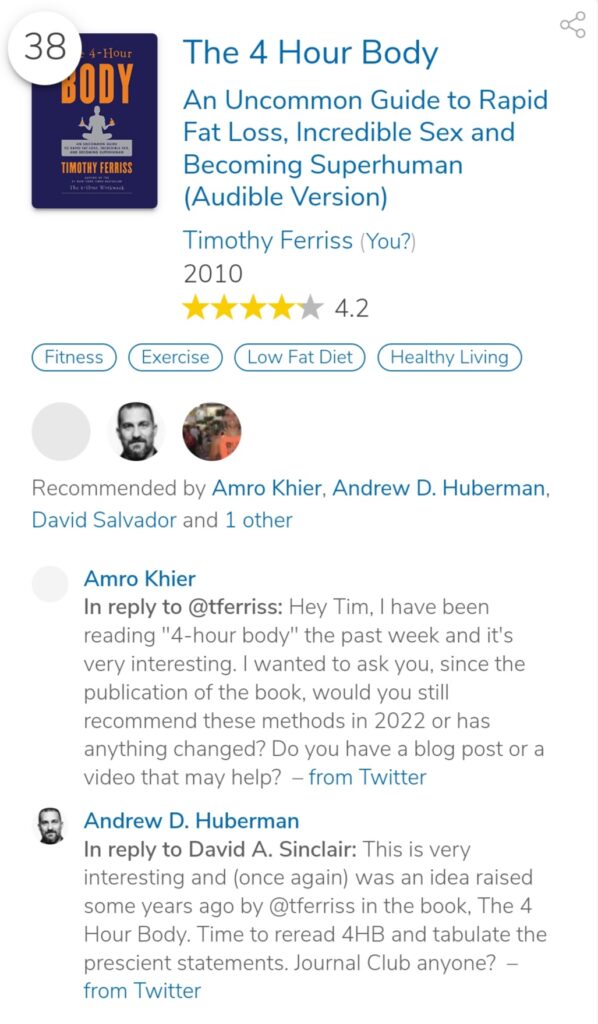While perusing the Bookauthority website, I stumbled upon a captivating blog post entitled “20 Best Fitness Audiobooks of All Time.” Sprinkled within the article were commendations from distinguished individuals who vouched for various titles. Intrigued by the mention of Andrew Huberman amongst the acclaimed recommenders, my curiosity piqued, compelling me to swiftly scroll down in anticipation of discovering his favored selection.
However, upon finishing the book and revisiting the website, I was taken aback. Andrew Huberman, whom I greatly admire and regularly listen to on his podcast, seemed to be endorsing a book that contradicted his own teachings. It was difficult to fathom. Yet, upon closer inspection, I realized that he hadn’t actually recommended the book outright. In fact, his comments were directed towards another person I highly respect, David A. Sinclair. Huberman did, however, offer a compliment to Timothy Ferriss regarding his suggestion in the book about the anti-aging benefits of giving blood. Yet, this compliment did not encompass his views on the entirety of the book. Interestingly, he also expressed his intention to reread the book, indicating that he was not dismissing it entirely either.

While the book claims to offer effective weight loss strategies, it presents an approach that is not only problematic but also potentially harmful to one’s overall well-being. This article will delve into the questionable recommendations made in Ferriss’s book, particularly concerning alcohol consumption and the concept of cheat days.
The Problematic Recommendations
1. Alcohol Consumption
Ferriss suggests that individuals can drink alcohol most every day, as long as it is low in calories. This advice is concerning for several reasons. Firstly, regular alcohol consumption can have adverse effects on physical and mental health, including liver damage, increased risk of certain cancers, and addiction. Secondly, alcohol is devoid of essential nutrients and can contribute to empty calorie intake, hindering weight loss efforts. Lastly, promoting daily alcohol consumption can perpetuate unhealthy drinking habits and reinforce alcohol dependency.
2. The Concept of Cheat Days
Another questionable recommendation put forth in Ferriss’s book is the idea of the “cheat day.” According to Ferriss, individuals can indulge in excessive eating and drinking on Saturdays, as long as they adhere to strict dietary restrictions for the rest of the week. While the concept of occasional treats is not inherently problematic, the unrestricted bingeing advocated by Ferriss can lead to an unhealthy relationship with food.

The Dangers of Unrestricted Bingeing
1. Disrupted Eating Patterns
Engaging in extreme bingeing on cheat days disrupts the natural hunger and satiety cues of the body. This can lead to an unhealthy cycle of overeating followed by deprivation, which can negatively impact the metabolism and overall weight management.
2. Psychological Implications
The unrestricted eating and drinking on cheat days can foster an unhealthy mindset surrounding food. It may perpetuate feelings of guilt, shame, and a lack of control, which can contribute to disordered eating patterns and the development of an unhealthy relationship with food.

A Focus on Health
1. Balanced Nutrition
A sustainable and healthy weight loss approach prioritizes balanced nutrition. It is essential to consume a variety of nutrient-dense foods that provide essential vitamins, minerals, and macronutrients. Ferriss’s emphasis on calorie counting and low-nutrient alcohol consumption overlooks the importance of nourishing the body with wholesome, nutrient-rich foods.
2. Moderation and Mindful Eating
Rather than endorsing excessive indulgence on cheat days, a healthier approach involves practicing moderation and mindful eating throughout the week. This entails being aware of portion sizes, listening to hunger and satiety cues, and making conscious choices that promote overall well-being.
3. Physical Activity
Ferriss’s book places minimal emphasis on physical activity, which is a crucial component of a healthy lifestyle. Regular exercise not only aids in weight loss but also improves cardiovascular health, boosts mood, and enhances overall fitness. Neglecting exercise in favor of extreme dietary strategies can result in a suboptimal approach to weight management.

Conclusion
While “The 4-Hour Body” by Timothy Ferriss may present itself as a weight loss solution, it promotes problematic recommendations that can compromise one’s overall health and well-being. The endorsement of daily alcohol consumption and unrestricted bingeing on cheat days overlooks the importance of balanced nutrition, moderation, and mindful eating. To achieve sustainable weight loss and maintain a healthy lifestyle, it is crucial to prioritize physical activity, consume a nutrient-rich diet, and develop a positive relationship with food.




